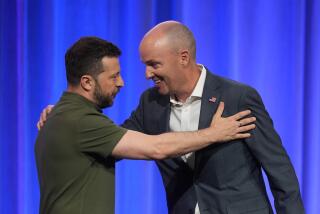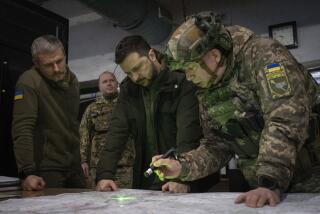‘I Won’t Beg’: Gorbachev : But He Tells Congress He Needs U.S. Trade Privileges : Soviet Seeks Support for ‘Revolution’
- Share via
WASHINGTON — Soviet President Mikhail S. Gorbachev today told congressional leaders who have been reluctant to grant him trade privileges that he needs their help. But he said he would not beg for concessions.
And he said a sound, stable Soviet Union is in America’s interests.
“We hear voices here in America saying . . . ‘Maybe the Soviet Union is so weak that we can defeat him with one stab.’ That’s not serious,” Gorbachev said in televised opening remarks at a meeting at the Soviet Embassy with a dozen congressional leaders.
“I’m not going to ask for anything, to beg for anything, even when I, for example, raise important matters such as trade. And it’s important for us now to expand trade because we are moving toward a market economy and it’s important for us to have the Americans participating in that process.
“But certainly we are not asking for a free ride. We will be asking for normal credits, and of course we will be paying, and paying the interest. For us it would be humiliating if we were to ask, to beg for something from you.”
“This is a genuine revolution,” Gorbachev told the lawmakers, who sat around a long, green-felt-covered table. “Please don’t be frightened, because you can frighten us, too, if you get frightened.
“We have to turn around our brains, as it were. This is a most difficult turnaround to make. Here, too, we hope we will find a mutual understanding and you will be able to find certain ways of supporting us, so that we could interact.
“Does the United States want (a) Soviet Union which is weak, torn by complexes and problems and turmoil? Or do you want a dynamic Soviet state that is open to the outside world?”
The Soviet leader also chided the congressional leaders for linking favored trade status for his country to Moscow’s handling of the Lithuanian drive for independence.
He accused the United States of having a double standard on intervening in the affairs of other countries. He pointed to the U.S. invasion of Panama last December.
“We have embarked on democratization,” Gorbachev said. “We are changing. . . . When we hear there is a debate in Congress about our affairs, this is resented in our society.”
He called Lithuania’s bid for independence, which U.S. lawmakers have said must be resolved before trade concessions can be granted to the Soviet Union, “a matter of sovereignty and national dignity” for his country.
Senate Majority Leader George J. Mitchell (D-Me.) defended the Panama invasion, saying it was different from Gorbachev’s crackdown in the Baltic because the people in Panama favored the U.S. action.
But Mitchell did not disagree when Gorbachev noted that President Bush has been inconsistent by granting unconditional most-favored-nation status to China, which a year ago brutally crushed a democracy movement.
Gorbachev said opening trade channels would be an important political plus for him as he seeks to restructure the Soviet economy to a more Western model.
More to Read
Sign up for Essential California
The most important California stories and recommendations in your inbox every morning.
You may occasionally receive promotional content from the Los Angeles Times.













